Summary
- 1 Origins of Apollo
- 2 The Sun God
- 3 Patron of Music
- 4 Apollo and Poetry
- 5 God of Prophecy
- 6 Healing and Medicine
- 7 Love Stories of Apollo
- 8 Myths and Legends
- 9 Apollo in art
- 10 Cultural influence
- 11 Symbol of Rationality
- 12 Intellectual enlightenment
- 13 Moral clarity
- 14 Legacy and Impact
- 15 Frequently asked questions
- 15.1 How did Apollo worship influence daily life in ancient Greece?
- 15.2 What are some modern interpretations of the Apollo archetype?
- 15.3 How is Apollo represented in contemporary literature and film?
- 15.4 What rituals were performed in ancient temples dedicated to Apollo?
- 15.5 How do the sun gods of other cultures compare with Apollo?
Apollo, the god of sunshine, is your perfect symbol of light and order. Born of Zeus and Leto, his presence shines in multiple spheres. With its golden lyre, Apollo reigns over music, poetry and the arts. As divine archer and healer, bringing clarity and harmony. His prophetic ability through theOracle of Delphi offers wisdom and guidance. Modern culture still reveres Apollo for rational thought and moral clarity. His influence on Western art, literature, and philosophy remains strong. If you are curious about how a god can embody such virtues, there is a fascinating world to discover.
Origins of Apollo
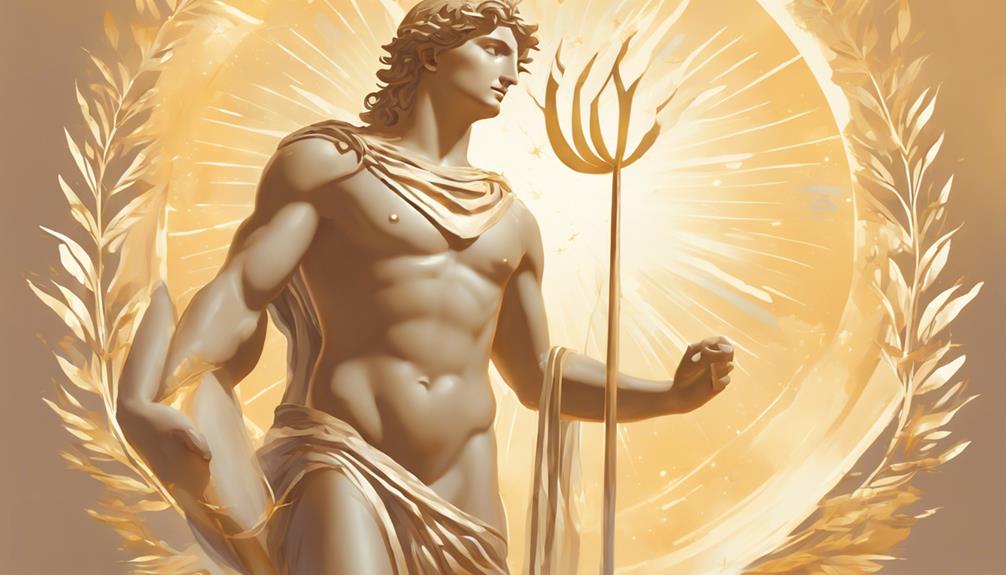
Apollo's roots run deep in the rich tapestry of Greek mythology, making him one of the most fascinating deities you will encounter. Born to Zeus, the ruler of the gods, and Leto, a Titan, Apollo's birth was not without drama. She was jealous of Hera, wife of Zeus, and forbade Leto to give birth on dry land. Leto eventually found refuge on the floating island of Delos, where she gave birth to Apollo and his twin sister, Artemis.
You will find that Apollo's story is full of fascinating tales and engaging connections. From the moment of his birth, Apollo was destined for greatness. Growing quickly into a handsome and powerful god, he embodied many virtues that the ancient Greeks held dear. Renowned for his golden lyre, a gift from Hermes, Apollo became the god of music, poetry and the arts. He was also a skilled archer and healer, demonstrating his diverse abilities.
Apollo's impact extended beyond his talents. As a god of prophecy, he was closely linked to the Oracle of Delphi, a sacred place where mortals sought advice. Through these varied roles, Apollo's origins depict a multifaceted deity who captivated the imagination of ancient Greece.
The Sun God
When you think of Apollo, his role as a Sun God shines probably more than anything else. You will see how its divine solar influence extends through mythology, bringing light and clarity. Moreover, its symbolism and iconography are rich in meaning, showing its power and presence.
Divine solar influence
As God of the Shining Sun, Apollo's divine impact permeates every aspect of light and order in the universe. You can sense his existence in the warmth of the sunrise, the clarity of daylight and the balance of the natural world. Apollo's role involves not only the physical sun, but also the illumination of the mind and spirit. His energy promotes growth, healing and enlightenment, guiding you to a harmonious existence.
To better understand Apollo's influence, let us examine its impact in different areas:
| Appearance | Influence |
|---|---|
| Nature | Promotes life and growth through sunlight |
| Healing | Linked to medical knowledge and health |
| Music | Unleash harmony and creativity |
In nature, Apollo's sunlight is vital to life, nourishing plants and animals. His connection to healing extends to the medical arts, symbolizing health and well-being. Through music, Apollo fills the world with rhythm and harmony, inspiring creativity.
Understanding Apollo's divine solar impact helps you perceive the interconnectedness of life. His presence ensures that light and order prevail, allowing you to flourish in a balanced and enlightened existence.
Symbolism and iconography
To truly appreciate Apollo's divine presence, it is necessary to understand the rich symbolism and iconography associated with the Sun God. Apollo is often depicted with a radiant halo, a symbol of his dominion over light and the sun. This luminous crown is not just a decorative element; it represents its role as a carrier of clarity and illumination.
You will also find Apollo holding a lira, a tool that represents harmony and the arts. As the protector of music, poetry and medicine, the lyre underscores his multifaceted nature. When you see images of Apollo with a bow and arrow, this highlights his appearance as a protector and hunter, emphasizing his precision and justice.
Another recurring symbol is the laurel wreath, which he wears as a crown or holds in his hand. This crown stands for victory and success, reflecting Apollo's triumphs and his association with theOracle of Delphi, where bay leaves were considered sacred.
Look for the wagon pulled by swans or horses in many representations. This chariot represents his daily journey across the sky, bringing sunrise and light to the world. Understanding these symbols helps you grasp the depth of Apollo's influence and the respect he commands.
Patron of Music
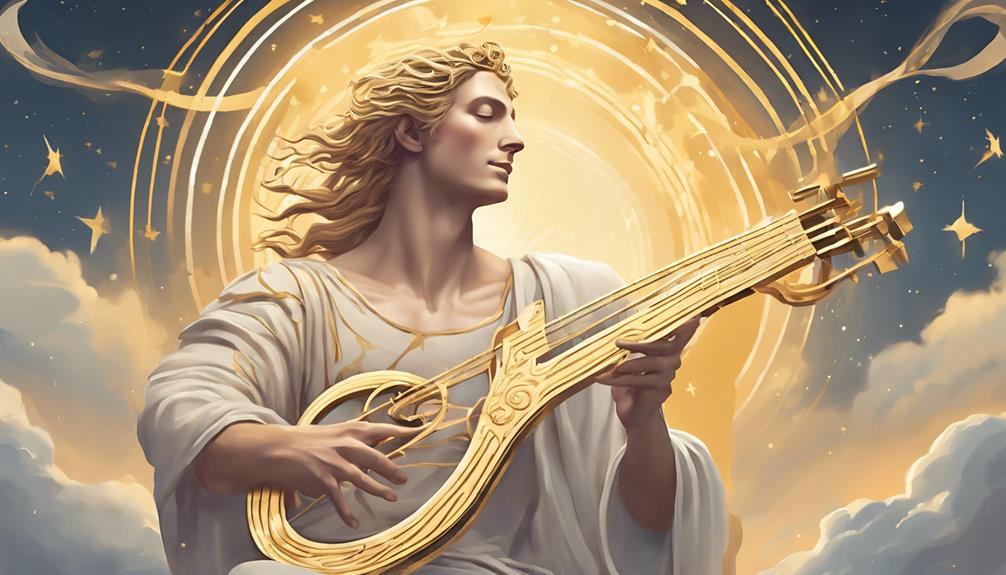
Apollo's mastery of the lyre made him the revered patron of music in Greek mythology. When you think of Apollo, picture him gracefully playing his golden lyre, a stringed instrument that became a symbol of musical harmony and beauty. This was not just an ordinary talent; Apollo's music could soothe the most upset and inspire the higher forms of creativity.
Being the god of music, Apollo was not exclusively focused on playing instruments. He also presided over the Muses, the nine goddesses who inspired all forms of art and science. Imagine Apollo leading a divine concert, with the Muses singing and dancing in perfect harmony. Together, they represented the culmination of artistic expression In ancient Greece.
If you wonder why music was so important, remember that the Greeks believed it had the power to bring order to chaos. Apollo's music symbolized the balance and structure he brought to the world. So the next time you hear a beautiful melody, think of Apollo and thetimeless influence he had on the world of music. His legacy serves as a reminder that music is not just entertainment; it is a divine gift that brings light and order to our lives.
Apollo and Poetry
When you think of Apollo and poetry, imagine him as thesupreme inspirer inspiring the greatest poets. His influence extends into both lyrical and epic forms, guiding poets to create works of beauty and depth. You will see his touch in the timeless verses That capture the human experience.
Inspiration of the Divine Muse
Through the call of poets in the world of inspiration, Apollo stands as the divine muse illuminating the path to poetic brilliance. When you seek to create verse that resonates with depth and beauty, it is Apollo's influence that guides your hand. As the god of poetry, he embodies the spark of creativity that transforms simple words into powerful expressions.
Imagine the moment when you find yourself struggling with a blank page. It is Apollo's touch that can ignite your imagination, turning uncertainty into a flow of ideas. His energy fuels your ability to see the world with new eyes, capturing emotions and scenes in ways that deeply touch others. Apollo's presence is not just about the mechanics of poetry; it is about the divine inspiration that elevates your work to new heights.
In any poetic endeavor, you are not alone. Apollo's guidance can be felt in the rhythm of your lines and the clarity of your imagery. By invoking his muse-like qualities, you access a source of creativity that is as timeless as it is profound. So whenever you feel the urge to write, remember that Apollo's illumination is there to guide you to poetic excellence.
Mastery of Lyric and Epic
In learning both lyric and epic poetry, you will find that Apollo's influence is the key to accessing the full potential of your craft. As the god of music, poetry and the arts, Apollo embodies the clarity, structure and inspiration needed to create timeless works. Whether you are creating a short emotional lyric or an expansive epic, invoking Apollo can enhance your poetry to new heights.
To harness the power of Apollo in your writing, consider these four essential elements:
- Clarity: Apollo's light shines through clear and precise language. Avoid ambiguity and make sure each word serves its purpose.
- Structure: Just as Apollo brings order to chaos, your poem should have a strong and coherent structure. Pay attention to meter, rhyme and form.
- Inspiration: Apollo is the divine muse. He opens yourself to inspiration through nature, music and introspection.
- Emotion: Whether in the brevity of a lyric or the grandeur of an epic, it evokes deep emotions. Apollo's influence helps you tap into universal human experiences.
God of Prophecy
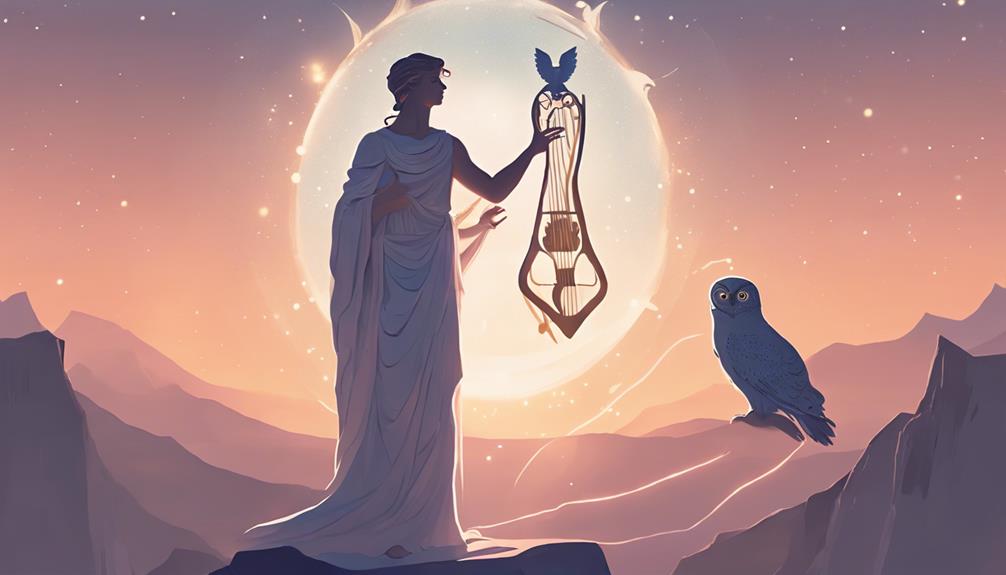
Embodying the god of prophecy, Apollo offers a glimpse into the future through his divine wisdom and oracles. You may be familiar with the famous Oracle of Delphi, where people from all over the ancient world sought Apollo's guidance. His prophetic abilities were not only limited to predicting events but also provided insights and advice on personal and political matters.
Here is a quick look at some key aspects of Apollo's prophetic role:
| Appearance | Description |
|---|---|
| Oracle of Delphi | The most renowned oracle, where the priestess Pythia spoke the words of Apollo. |
| Prophetic Symbols | The laurel leaves and tripod are key symbols of its prophetic powers. |
| Role in Mythology | He guided heroes like Orestes and Aeneas with his prophecies. |
| Influence in Decisions | Kings and leaders often consulted him before making important decisions. |
| Connecting with Music | His prophecies were sometimes conveyed through songs or poetic verse. |
Apollo's prophecies were revered because they offered clarity and direction. By consulting Apollo, you could gain wisdom and predict possible outcomes, making decisions with greater trust. His role as a god of prophecy underscores his importance in bringing light and order to the chaos of the unknown.
Healing and Medicine
With his skill in healing and medicine, Apollo was not only a god of light but also a divine physician who could cure diseases and bring well-being. You may be surprised to learn that Apollo's abilities extended far beyond prophecy and music. His role as a healer was vital in ancient Greek mythology and he was often invoked to restore health and strength.
To give you a better understanding, here are four key aspects of Apollo's healing powers:
- Patron of Doctors: Apollo was considered the patron god of physicians and healers. His influence extended to those who practiced medicine, ensuring that they could provide effective treatments.
- Plague and Cure: Apollo had the power both to trigger and to cure epidemics. When he was angry, he could spread disease, but he could also be invoked to remove such afflictions.
- Shrine of Healing: The island of Delos, Apollo's birthplace, was considered a sacred place of healing where people sought remedies for various ailments.
- Father of Asclepius: Apollo was the father of Asclepius, the god of medicine, who inherited and expanded his father's healing abilities, further consolidating Apollo's legacy in the medical field.
Understanding Apollo's role as healer helps you appreciate the breadth of his divine responsibilities.
Love Stories of Apollo
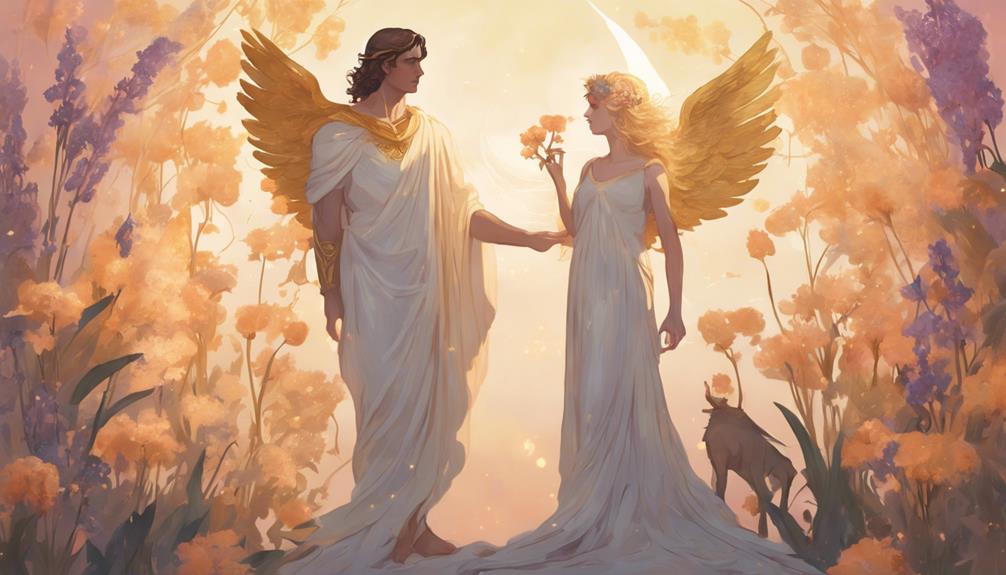
In his mythological stories, Apollo's loves were as numerous and complex as his divine powers. Whether it was his hunt for Daphne or his tragic love affair with Hyacinthus, Apollo's relationships were marked by both passion and pain. These stories reveal much about his character, depicting him as a tireless lover and a god capable of deep emotions.
To make it easier to understand, here is a brief overview of some of his notable love interests:
| Name | Nature of the Report | Outcome |
|---|---|---|
| Daphne | Unrequited love | Transformed into a laurel tree |
| Hyacinth | Romantic love | Accidentally killed, turned into a flower |
| Coronid | Extramarital affair | Killed for infidelity, mother of Asclepius |
| Cassandra | Cursed lover | Given the gift of prophecy, but cursed |
Each of these stories illustrates different aspects of Apollo's love life. For example, his unrequited love for Daphne led to her transformation into a laurel tree, symbolizing eternal chastity. Conversely, his love for Hyacinth ended in tragedy when a discus accident led to the young man's death, demonstrating how even gods can experience loss and pain. Understanding Apollo's loves helps you appreciate the depth and complexity of this multifaceted deity.
Myths and Legends
In delving into the myths and legends of Apollo, you will discover compelling tales of his birth and young life, his position at theOracle of Delphi, and on his heroic murder of the Python. These stories emphasize his divine origins and his vital role in maintaining order. We analyze these legendary moments that shape Apollo's powerful legacy.
Birth and Early Years
Born amid divine intrigue and celestial drama, Apollo's early life is a mosaic of fascinating myths and legends that shape his enduring legacy. You will find that his story begins with his mother, Leto, a Titaness who attracted the attention of Zeus. Hera, Zeus' jealous wife, was not pleased and cursed Leto, making it almost impossible for her to find a place to give birth.
Despite Hera's efforts, Leto found refuge on the floating island of Delos, where he eventually gave birth to Apollo and his twin sister, Artemis. From this dramatic beginning, Apollo's childhood was filled with extraordinary events:
- Precocity: Apollo grew at an extraordinary speed, becoming an adult god in a matter of days.
- Python Killing: One of his first heroic acts was killing the serpent Python, who had tormented his mother.
- Music and the Arts: Apollo received the lyre from Hermes and became the god of music, arts and knowledge.
- Healing Powers: Taught by Chiron, Apollo acquired the gift of healing, symbolizing his role as the bringer of health and order.
Understanding these early stories helps you appreciate how Apollo's character was shaped by divine challenges and triumphs.
Oracle of Delphi
Having demonstrated his power and wisdom from the beginning, Apollo's next great undertaking was to establish the Oracle of Delphi, where his prophecies would shape the ancient world. Imagine visiting Delphi, a place located on the slopes of Mount Parnassus, where the air rumbles with divine energy. You would be confronted by the Pythia, the priestess of Apollo, who would deliver her cryptic messages to seekers from all walks of life: kings, warriors and ordinary people.
Here is a look at the significance of the Oracle of Delphi:
| Appearance | Description |
|---|---|
| Location | Mount Parnassus, central Greece |
| Priestess | Pythia |
| Function | Transmitting the prophecies of Apollo |
| Visitors | Kings, warriors, ordinary people |
The Oracle of Delphi was not just a sacred place; it was the epicenter of divine guidance. You would find people traveling long distances, seeking answers to questions about war, love and destiny. The Pythia, sitting on a chasm that emitted ethereal vapors, would enter a trance-like state to communicate Apollo's enigmatic prophecies. These prophecies often required careful interpretation, adding layers of mystery and reverence to the process.
Killing the Python
Imagine standing on the very spot where Apollo, the god of light and order, fought and defeated the monstrous Python to reclaim his sacred oracle at Delphi. This legendary encounter was not just a physical battle; it was a struggle between chaos and order, darkness and light. Apollo's victory over the Python symbolizes the triumph of rationality and enlightenment over darkness and primordial chaos.
In the myth, the Python was a fearsome serpent who guarded the sacred site of Delphi. Here is a summary of the key points of this myth:
- The Challenge: Apollo, determined to establish his oracle, confronted the Python who was wreaking havoc and terror.
- The Battle: Armed with his golden bow and arrows, Apollo engaged in a fierce battle with the beast.
- The Victory: Apollo's mastery and divine power led to the Python's defeat, securing his role as guardian of Delphi.
- The Consequences: Apollo established the Pythian Games in honor of his victory, celebrating physical and artistic dexterity.
Apollo in art
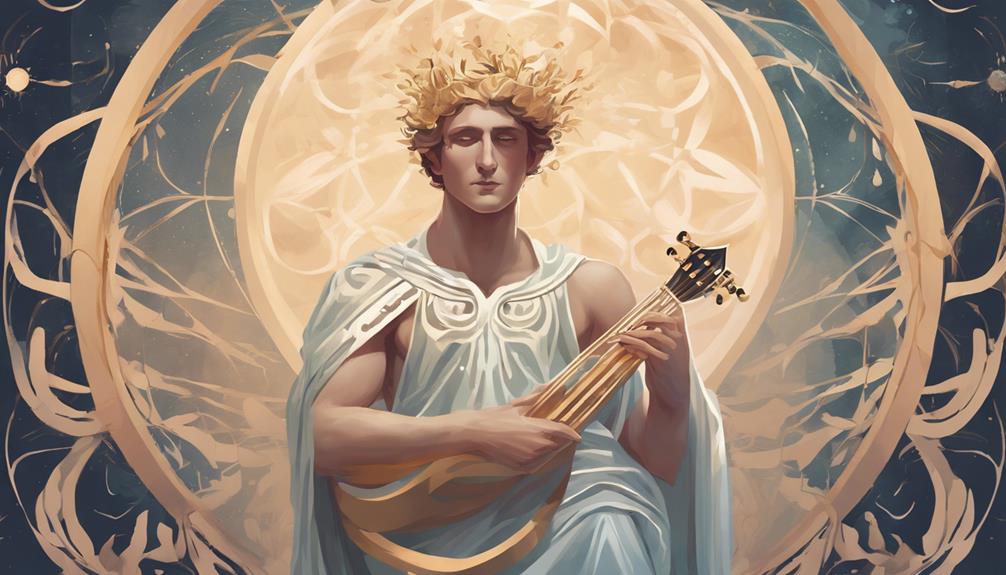
Throughout history, artists have captured Apollo's radiant essence in countless paintings and sculptures, each reflecting his divine role as the god of light and order. When you examine these works of art, you will see how they convey his beauty, power and serenity. Depictions of Apollo vary, but common elements highlight his youthful appearance, laurel wreath, and lyre.
Let us examine some remarkable art masterpieces depicting Apollo:
| Artwork | Artist | Half |
|---|---|---|
| Belvedere Apollo | Unknown (Ancient Rome) | Marble sculpture |
| The Parnassus | Raphael | Fresco |
| Apollo and Daphne | Gian Lorenzo Bernini | Marble sculpture |
| Apollo and the Muses | Claude Lorrain | Oil on canvas |
| Apollo pursues Daphne | Giovanni Battista Tiepolo | Oil on canvas |
These masterpieces span different periods and styles, showing Apollo's enduring appeal. For example, the Belvedere Apollo is a celebrated ancient sculpture that embodies classical beauty, while Raphael's fresco 'The Parnassus' places Apollo among the muses, emphasizing his role in the arts.
As you examine these works, notice how each artist interprets Apollo's divine attributes. Whether through the realistic detail of a sculpture or the vibrant colors of a painting, Apollo's presence continues to inspire awe and admiration.
Cultural influence
Apollo's influence extends far beyond mythology, permeating various aspects of culture and shaping countless artistic, literary and musical works. You will find his presence in the following areas:
- Literature: Apollo appears in numerous literary classics, from ancient Greek epics to modern novels. His character often symbolizes enlightenment, prophecy, and the arts.
- Music: As the god of music, Apollo has inspired countless compositions. Many classical works, such as those of Mozart and Beethoven, are inspired by his mythological attributes.
- Art: In addition to traditional painting and sculpture, Apollo's image is widespread in contemporary visual arts, influencing everything from graphic design to film.
- Theater: Its stories and characteristics have been adapted into various plays and performances, emphasizing themes of order, beauty and rationality.
Understanding Apollo's cultural impact helps you appreciate how deeply these ancient legends still resonate today. Whether through a novel, a musical composition, or a painting, Apollo's legacy continues to inspire and shape creative expressions. By acknowledging his influence, you gain a richer perspective on how the ancient archetypes still play an essential role in modern culture.
Symbol of Rationality
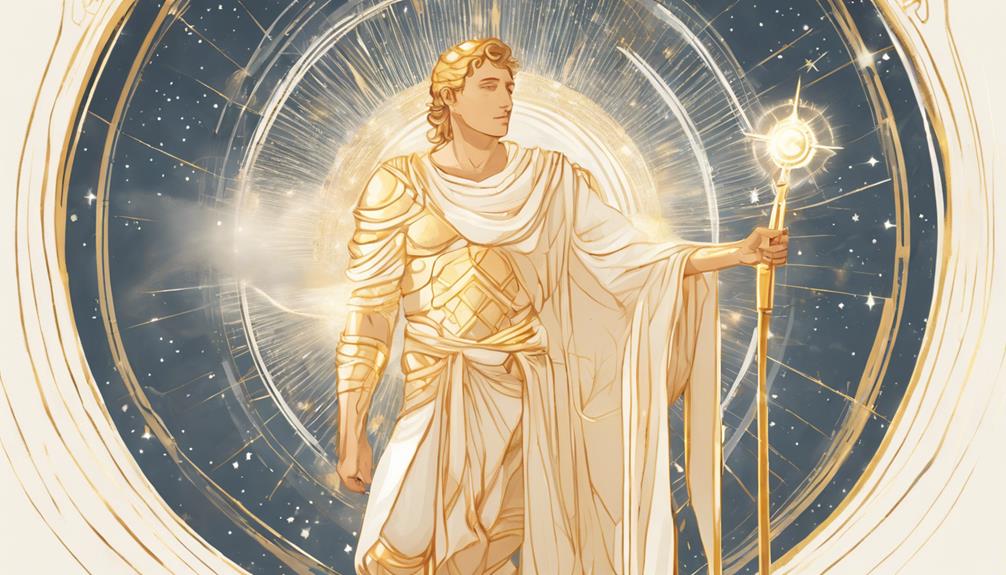
In addition to his cultural influence, Apollo also represents a powerful symbol of rationality, embodying logic, reason, and structured thinking. In ancient mythology, Apollo was often associated with clarity of mind, a guiding light of intellect in a world full of chaos and unpredictability. When you think of Apollo, imagine a deity who values clear thinking and precise action above all else.
Apollo's emphasis on rationality is evident in various myths in which he brings order to disorder. For example, he was known for his oracular abilities at Delphi, providing understandings deeply rooted in wisdom and foresight. These prophecies were not only about predicting the future but also about guiding people through reasoned advice.
In art, Apollo is often depicted with attributes that symbolize intellectual clarity, such as the laurel wreath, which is a sign of victory and enlightenment. His influence encourages you to approach problems not with impulsive actions, but with thoughtful deliberation.
Intellectual enlightenment
In the realm of intellectual enlightenment, Apollo shines as a guiding light that leads you toward wisdom and understanding. As the god of knowledge and the arts, he represents the pursuit of intellectual growth and clarity of thought. When you think of Apollo, imagine the embodiment of enlightenment inspiring you to seek truth and foster a deeper understanding of the world around you.
To follow the path of Apollo's intellectual enlightenment, consider these four key aspects:
- Curiosities: Cultivate a relentless curiosity about the world. Ask questions, seek answers, and never settle for superficial knowledge.
- Critical thinking: Develop the ability to analyze and evaluate information logically. Do not accept things as they are; instead, scrutinize and understand the underlying principles.
- Creativity: Let your imagination flourish. Apollo is also the god of the arts, reminding you that creativity and intellectual pursuit go hand in hand.
- Education: Engage in continuous learning. Whether through formal education or self-study, constantly expand your horizons and deepen your understanding.
Moral clarity
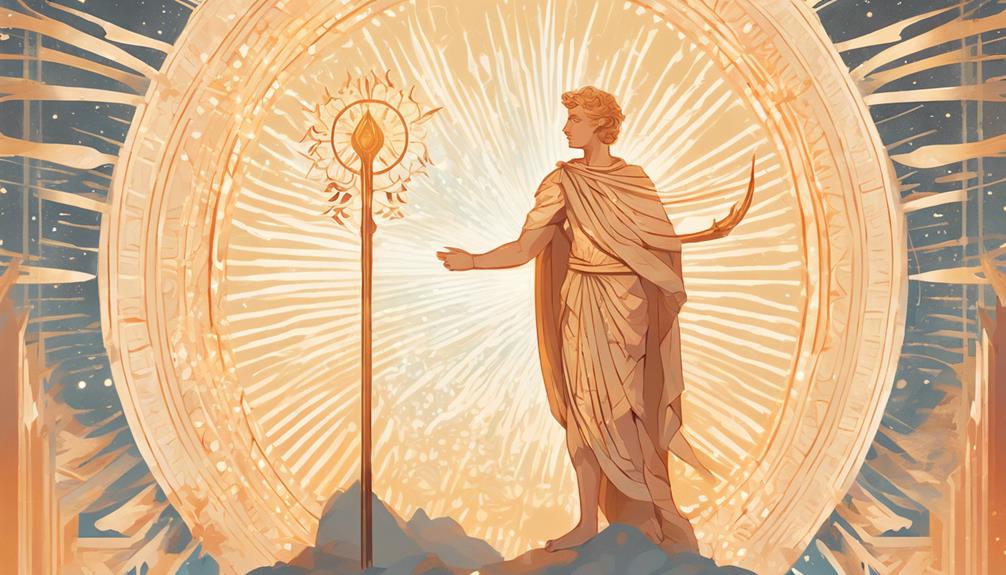
As you search for theintellectual enlightenment, it is essential to cultivate the moral clarity To guide your actions and decisions. Apollo, the Greek god of light and order, symbolizes this very principle. He represents not only knowledge, but the ethical framework necessary to apply that knowledge wisely. Understanding its essence helps you appreciate the importance of having a moral compass.
Moral clarity involves distinguishing good from evil, and Apollo's myths often highlight this concept. For example, when he punished the wicked or rewarded the virtuous, he demonstrated the need for ethical judgment. By embodying Apollo's virtues, you can aim for a balanced life in which your decisions are aligned with a strong sense of justice.
In today's complex world, moral clarity serves as your guiding star. It helps you navigate the murky waters of the ethical dilemmas and of the conflicting interests. Embracing the archetype of Apollo means making a commitment to principles that promote equity, honesty and integrity. It is not just about knowing what is right; it is about practicing it consistently.
In essence, moral clarity is the foundation for making ethical and well-founded decisions. Let Apollo's light illuminate your path, ensuring that your intellectual efforts are ethically grounded.
Legacy and Impact
You might be surprised by how much the legate of Apollo shaped Western culture, influencing philosophical thought and inspiring countless works of art. Its symbolism is still alive today, especially in themodern art where light and order are recurring themes. The impact of Apollo is a tribute to the enduring power of myth in our lives.
Influence on Western culture
Apollo's influence on Western culture is evident in everything from art and literature to modern science and philosophy. You can see his impact in various aspects of daily life, shaping the way people think and create. Here are four key areas where Apollo's legacy is particularly evident:
- Art and Sculpture: Artists of ancient Greece often depicted Apollo in their works, showcasing his idealized human form. This emphasis on beauty and perfection has influenced Western art for centuries, inspiring countless artists.
- Literature and Poetry: Apollo, as god of music and poetry, has been a muse for writers and poets. His stories and attributes appear in works from Homer's epics to contemporary literature, enriching narratives with themes of light, order, and rationality.
- Medicine and Healing: Apollo was also associated with healing, and this connection can be seen in the Hippocratic Oath taken by physicians, which invokes his name. His influence underscores the importance of ethics and care in medicine.
- Philosophy and Rational Thinking: Apollo symbolizes logic and reason, fundamental elements of Western philosophy. Thinkers such as Plato and Socrates built on these ideals, shaping the way Western civilization values knowledge and rationality.
Symbolism in modern art
Even in today's varied art, the symbolism of Apollo continues to resonate, embodying themes of light, order and rationality. You might notice it in the textured lines of modern architecture or in the harmonious light palettes of contemporary paintings. Artists often draw on Apollo's legacy to communicate clarity and balance, leveraging his association with the sun to illuminate their creations.
Consider a modern sculpture with clean, geometric forms. It is likely inspired by the ideals of Apollo, reflecting a quest for perfection and harmony. Or think of a digital artwork that uses light to create depth and perspective; it channels the essence of Apollo, combining technology with timeless principles of order.
In photography, you will see Apollo's influence in compositions that emphasize symmetry and light. These elements guide the viewer's eye, bringing a sense of tranquility and understanding to the scene. By incorporating the symbolism of Apollo, artists create works that speak to our innate desire for structure and meaning.
Frequently asked questions
How did Apollo worship influence daily life in ancient Greece?
The cult of Apollo shaped daily life in ancient Greece in many ways. You would find people visiting temples, seeking oracles, and participating in festivals such as the Pythian Games. He was not only a god of light but also of music, healing, and prophecy. His influence was everywhere, from art to medicine. Daily prayers and rituals were common, reflecting its importance in the maintain balance and order In their lives.
What are some modern interpretations of the Apollo archetype?
Modern interpretations of the Apollo archetype often see him as a symbol of creativity, rationality, and healing. You can find him represented in literature, art, and psychology. For example, in self-help books, Apollo's traits are linked to personal growth and clarity. In popular culture, he can be an inspirational figure, embodying the pursuit of knowledge and artistic expression. His influence remains relevant and adaptable to contemporary values.
How is Apollo represented in contemporary literature and film?
In contemporary literature and film, Apollo is often seen depicted as a symbol of reason, creativity, and order. He is depicted as a guiding force, inspiring characters to pursue knowledge and artistic expression. Sometimes, he is shown with a modern twist, embodying the duality of light and shadow. These depictions make Apollo easily identifiable, mixing ancient mythology with today's themes, keeping his essence alive and relevant.
What rituals were performed in ancient temples dedicated to Apollo?
In ancient temples dedicated to Apollo, rituals such as performances of music and poetry could be witnessed, since he was the god of the arts. Priests and worshippers offered sacrifices, typically goats, and performed purification rites. They also consulted oracles, especially at Delphi, seeking Apollo's guidance. Festivals such as the Pythian Games were held in his honor, with athletic and artistic competitions to celebrate his divine influence.
How do the sun gods of other cultures compare with Apollo?
When looking at the solar deities of other cultures, one finds both similarities and differences with Apollo. For example, Ra of Egyptian mythology is also a powerful solar deity, but he is more connected to creation and kingship. In Hinduism, Surya is the solar deity, embodying health and energy. Like Apollo, these deities represent light and life, yet each culture ascribes unique attributes and meanings to them.
